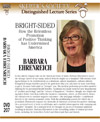The Amaz!ng Meeting 8
Enthusiasm for TAM increases every year. This year promises to be one of the most exciting so far, with a great combination of leading thinkers, celebrities and activists, all united to advance critical thinking and skepticism in our world…
The Amaz!ng Lineup of Speakers
James Randi • Richard Dawkins (keynote) • Adam Savage • Paul Kurtz • Michael Shermer • Phil Plait • Jennifer Michael Hecht • Penn & Teller • Ken Frazier • Carol Tavris • D.J. Grothe • Simon Singh • Martin Gardner • Jamy Ian Swiss • Banachek • Massimo Pigliucci • The Skeptics Guide to the Universe • Sean Faircloth • James McGayha • Ray Hyman • Richard Saunders • K.O. Myers • Maria Walters • Travis Roy • Maggie McFee • Jeff Wagg • Alison Smith • Michael Goudeau • Michael Weber • Roy Zimmerman • Barry Karr • Dr. Ginger Campbell • Steve Craig • Mac King • Daniel Loxton • Mike Jones • Hal Bidlack
In this week’s eSkeptic, Victoria Bekiempis reviews The Case for Rational Optimism by Frank S. Robinson. Victoria Bekiempis is a freelance writer based in Brooklyn, New York. Bekiempis has written on topics ranging from botched redevelopment projects, to guano harvesting, to reality TV tryouts. She studied philosophy and languages at the University of South Florida. When she’s not working, Bekiempis is probably reading sci-fi or cooking a mean curry.

Optimism v. Realism
a book review by Victoria Bekiempis
SO YOU’VE LOST YOUR JOB. Or you’ve gone through a bitter divorce. Or your house is in foreclosure. Or your 401-K is sapped. Your kids don’t talk to you. You’re balding. You can’t just lose that fat tire around your belly. You’re sad, and life seems gloomy and meaningless at best. You’re in the midst of existential woe. Ennui that’s beyond Sartre (and his wonky eye!). Or maybe it’s just another Monday, and the fluorescents bug you out.
Whatever the case, you stumble upon Frank S. Robinson’s book The Case for Rational Optimism. You say to yourself: “How curious and fortuitous! Here’s a book on why life is generally good … and right when I need it most!” So you start reading, and you keep reading, and you find that your new hope in optimism starts to wane. Not because Robinson advocates anything silly like a glib, Pangloss-like approach to existence. Robinson would have actually been doing us a favor had he done that. Instead, Robinson makes us endure some 300 pages of fallacy and cliché-laden prose — with the occasional sprinkling of sexism.
So let’s begin with the beginning. Robinson’s thesis seems innocuous enough: life has its highs and lows, but it’s generally good. All facts considered, we should have a positive outlook on ourselves and the world. And we should put “individuals and their flourishing first and foremost.” Overall, “we are headed in the right direction.”
This is banal enough. It’s when Robinson leaves some hard-to-answer big questions unanswered, then uses rhetorical questions to solidify his thesis, that his book begins to unravel. One example: after a rather simplified rundown of evolution, Robinson offers the reader a description of the human condition that can be described as “existentialism light” — ultimate freedom meets self help. Lack of cosmic freedom, he writes, does not translate into nihilism. “Our ultimate freedom to create our own meaning is no less beautiful and awesome. You are the center of your own universe,” he writes. Robinson then asks, “well, is the meaning we create worthwhile and worth living for?” His answer is troublesome: “All of us are together on this little lifeboat of a planet, striving to make the best of the human condition. What more purpose could we need?”
As beautiful as this sounds, it remains problematic in a few senses. First, it seems to assume that human-condition pessimists maintain such a mindset because they’re troubled by meaninglessness. There are many more reasons for such pessimism: cancer, rape, genocide, famine, etc. Second, it seems to neglect why philosophers have argued about the human condition for millennia — it’s something we examine, not just pass off as, “It is what it is, cool!” We agonize over what causes us agony, and that’s why emotional unrest is not easily quelled. I don’t know whether a philosophic “Let’s make the best of this!” can mollify pessimists who remain troubled about a dearth of cosmic meaning. And it’s unclear whether even the presence of meaning would resolve pessimists’ very real human-condition concerns.
Another big flaw that occurs throughout the book is Robinson’s assumptions about longstanding philosophical dilemmas. Take evil — specifically, whether the presence of evil postulates certain qualities about the human condition. Robinson writes: “One of our most obsessive questions is why too often in this world wickedness prospers while the good suffer. Why does this torment us so? It is because we are, again, fundamentally moral beings.”
Any reader’s opinion on optimism (mine included) notwithstanding, this does not seem like a proper rejoinder to evil, let alone evidence that human nature makes us more good than bad. Consider: Robinson is essentially trying to ascertain cause from effect. In this case, he has extrapolated a cause of “inherent human good” from “unrest toward evil.” For the sake of mere argument, it is possible that humans might be troubled by evil because of what evil often equates to: property loss, physical damage, societal instability. Evil, at one very basic level, is a pain in terms of day-to-day life. To claim that our dismay about evil is proof of inherent good requires more work, which Robinson does not do.
These issues, moreover, are not isolated incidents — they occur within the beginnings of Robinson’s writing and set the premise for many of his later arguments, making them particularly troubling snags.
But troubles with Robinson’s premises aren’t all that irked me. I’m also a bit peeved by his portrayal of women. Apparently, our genes (bless them!) make us money-grubbing social climbers. “Women are wired to seek mates with high status, because that’s an indicator of good genes their children will inherit,” he writes. Robinson then quotes Aristotle Onassis’ charming quip on the female disposition, that if “women didn’t exist, all the money in the world would have no meaning.” In all fairness, Robinson wasn’t saying that women had to act this way. Rather, he said that we’d be happier if we understood our drive toward bling and power. Still, the whole exchange smells a little 1950s.
I’m also wary of any analogy that uses domestic violence to prove a point. Robinson compares people’s veneration of flawed governments to “battered wives who still profess undying love for their abusers.” As well, I was a bit disturbed by a statement he made about single mothers and poverty. Arguing that inequality is temporary among demographics, Robinson writes: “There are many causes: being a student or single mother, illness or disability, divorce, job loss, recent immigration. But many single moms will marry, many ill people recover, most students graduate into the workforce, most unemployed find jobs, most immigrants assimilate and prosper.” Call me crazy, but it seems like Robinson is suggesting that a single mom’s route out of poverty is marriage. There’s that 1950s eau de toilette again.
Of course, Robinson might have a few words to say about this critique. I might be lumped with the pessimists, chastised as a member of, as Robinson describes it, the “bumper crop of carping crybabies” that’s ruining America.
What’s important to remember is that none of what I’ve said about Robinson’s book really deals with the merits of its ideological goal, but rather the strength of Robinson’s argument on it’s own. Unfortunately, it’s a weak one. But I’m optimistic that such a good idea as rational optimism won’t go too long without a better-suited spokesman.
Skeptical perspectives on positive thinking,
fads and faulty intelligence
-
 Faulty Intelligence
Faulty Intelligence
(Music CD $15) by Roy Zimmerman -
Roy Zimmerman has been writing satirical songs for twenty years. He’s shared the stage with George Carlin, Bill Maher, Kate Clinton, Dennis Miller, Sandra Tsing Loh, kd lang, Andy Borowitz, and Paul Krassner, and played a series of shows swapping songs with The Pixies’ Frank Black. Highlights include a lesson in “Creation Science 101,” the bawk-along “Chickenhawk,” and a plantive plea to “Abstain With Me.” Also, new recordings of Zimmerman classics, “My Conservative Girlfriend” and “Defenders of Marriage.”
-
 Bright-Sided: How the Relentless Promotion
Bright-Sided: How the Relentless Promotion
of Positive Thinking has Undermined America
(DVD $23.95 CD $15.95) by Barbara Ehrenreich -
In this utterly original take on the American frame of mind, Barbara Ehrenreich traces the strange career of our sunny outlook from its origins as a marginal 19th-century healing technique to its enshrinement as a dominant, almost mandatory, cultural attitude.
-
 Flavour of the Month: Why Smart People Fall for Fads
Flavour of the Month: Why Smart People Fall for Fads
(hardback $19.95) by Joel Best -
Sociologist Best dissects the dangerous hula hoops of business, medicine, science and education in this exposition on institutional fads. According to Best, American attitudes toward progress (colored by optimism, competitiveness, a belief in positive change and a fear of being seen as old-fashioned) serve as kindling to the fire of the next big cure, technological revolution, business management secret or teaching method.

NEW ON SKEPTICBLOG.ORG
The Rules of Capitalism, Part 3
This is the third essay in a series on the relationship between rules, freedom, and prosperity. To get up to speed, read part 1 on Skepticblog.org and part 2 over at True/Slant
NEW ON MICHAELSHERMER.ORG
Doing Science in the Past
In the May issue of Scientific American, Dr. Michael Shermer discusses how Jared Diamond, one of the greatest minds of our time, uses the comparative method of historical science to help explain poverty in Haiti.












